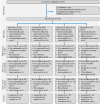Clinical Outcomes in Routine Evaluation Measures for Patients Discharged from Acute Psychiatric Care: Four-Arm Peer and Text Messaging Support Controlled Observational Study
- PMID: 35409483
- PMCID: PMC8997547
- DOI: 10.3390/ijerph19073798
Clinical Outcomes in Routine Evaluation Measures for Patients Discharged from Acute Psychiatric Care: Four-Arm Peer and Text Messaging Support Controlled Observational Study
Abstract
Background: Peer support workers (PSW) and text messaging services (TxM) are supportive health services that are frequently examined in the field of mental health. Both interventions have positive outcomes, with TxM demonstrating clinical and economic effectiveness and PSW showing its utility within the recovery-oriented model. Objective: To evaluate the effectiveness of PSW and TxM in reducing psychological distress of recently discharged patients receiving psychiatric care. Methods: This is a prospective, rater-blinded, pilot-controlled observational study consisting of 181 patients discharged from acute psychiatric care. Patients were randomized into one of four conditions: daily supportive text messages only, peer support only, peer support plus daily text messages, or treatment as usual. Clinical Outcomes in Routine Evaluation—Outcome Measure (CORE-OM), a standardized measure of mental distress, was administered at four time points: baseline, six weeks, three months, and six months. MANCOVA was used to assess the impact of the interventions on participants’ scores on four CORE-OM subscales across the three follow-up time points. Recovery, clinical change, and reliable change in CORE-OM all-item analysis were examined across the four groups, and the prevalence of risk symptoms was measured. Results: A total of 63 patients completed assessments at each time point. The interaction between PSW and TxM was predictive of differences in scores on the CORE-OM functioning subscale with a medium effect size (F1,63 = 4.19; p = 0.045; ηp2 = 0.07). The PSW + TxM group consistently achieved higher rates of recovery and clinical and reliable improvement compared to the other study groups. Additionally, the text message group and the PSW + TxM group significantly reduced the prevalence of risk of self/other harm symptoms after six months of intervention, with 27.59% (χ2(1) = 4.42, p = 0.04) and 50% (χ2(1) = 9.03, p < 0.01) prevalence reduction, respectively. Conclusions: The combination of peer support and supportive text messaging is an impactful intervention with positive clinical outcomes for acute care patients. Adding the two interventions into routine psychiatric care for patients after discharge is highly recommended.
Keywords: CORE-OM; acute care; distress; hospital discharge; mental health; peer support worker; support; text messages.
Conflict of interest statement
The authors declare no conflict of interest.
Figures
Similar articles
-
Recovery Following Peer and Text Messaging Support After Discharge From Acute Psychiatric Care in Edmonton, Alberta: Controlled Observational Study.JMIR Form Res. 2021 Sep 3;5(9):e27137. doi: 10.2196/27137. JMIR Form Res. 2021. PMID: 34477565 Free PMC article.
-
Enhancing peer support experience for patients discharged from acute psychiatric care: protocol for a randomised controlled pilot trial.BMJ Open. 2018 Aug 17;8(8):e022433. doi: 10.1136/bmjopen-2018-022433. BMJ Open. 2018. PMID: 30121611 Free PMC article. Clinical Trial.
-
Reducing readmission rates for individuals discharged from acute psychiatric care in Alberta using peer and text message support: Protocol for an innovative supportive program.BMC Health Serv Res. 2022 Mar 12;22(1):332. doi: 10.1186/s12913-022-07510-8. BMC Health Serv Res. 2022. PMID: 35279142 Free PMC article.
-
Novel Augmentation Strategies in Major Depression.Dan Med J. 2017 Apr;64(4):B5338. Dan Med J. 2017. PMID: 28385173 Review.
-
Systematic reviews of the effectiveness of day care for people with severe mental disorders: (1) acute day hospital versus admission; (2) vocational rehabilitation; (3) day hospital versus outpatient care.Health Technol Assess. 2001;5(21):1-75. doi: 10.3310/hta5210. Health Technol Assess. 2001. PMID: 11532238 Review.
Cited by
-
Psychological Health and Wellness and the Impact of a Supportive Text Messaging Program (Wellness4MDs) Among Physicians and Medical Learners in Canada: Protocol for a Longitudinal Study.JMIR Res Protoc. 2024 Sep 16;13:e44368. doi: 10.2196/44368. JMIR Res Protoc. 2024. PMID: 39283660 Free PMC article.
-
Cost analysis of COVID-19 test result notification using an automated messaging system compared to a staff caller practice in Alberta.Can J Public Health. 2023 Apr;114(2):207-217. doi: 10.17269/s41997-023-00748-7. Epub 2023 Feb 16. Can J Public Health. 2023. PMID: 36795278 Free PMC article.
-
Factors associated with unplanned readmissions for patients with mental and behavioural disorders in China: a quantitative analysis.Glob Health Action. 2024 Dec 31;17(1):2435642. doi: 10.1080/16549716.2024.2435642. Epub 2025 Jan 20. Glob Health Action. 2024. PMID: 39829332 Free PMC article.
-
Comparison of false positive and false negative rates of two indices of individual reliable change: Jacobson-Truax and Hageman-Arrindell methods.Front Psychol. 2023 Jul 13;14:1132128. doi: 10.3389/fpsyg.2023.1132128. eCollection 2023. Front Psychol. 2023. PMID: 37519369 Free PMC article.
-
Cancer Care Supportive Text Messaging Program (Text4Hope) for People Living With Cancer and Their Caregivers During the COVID-19 Pandemic: Longitudinal Observational Study.JMIR Form Res. 2024 Apr 24;8:e53668. doi: 10.2196/53668. JMIR Form Res. 2024. PMID: 38657234 Free PMC article.
References
-
- Faessler L., Kutz A., Haubitz S., Mueller B., Perrig-Chiello P., Schuetz P. Psychological distress in medical patients 30 days following an emergency department admission: Results from a prospective, observational study. BMC Emerg. Med. 2016;16:33. doi: 10.1186/s12873-016-0097-y. - DOI - PMC - PubMed
-
- Chavasiri S. Depression and Quality of Life in Spinal Cord Injury Patients Living in the Community after Hospital Discharge. Siriraj Med. J. 2020;72:59–66. doi: 10.33192/Smj.2020.08. - DOI
-
- Vlake J.H., Wesselius S., van Genderen M.E., van Bommel J., Boxma-de Klerk B., Wils E.-J. Psychological distress and health-related quality of life in patients after hospitalization during the COVID-19 pandemic: A single-center, observational study. PLoS ONE. 2021;16:e0255774. doi: 10.1371/journal.pone.0255774. - DOI - PMC - PubMed
-
- Walter F., Carr M.J., Mok P., Antonsen S., Pedersen C.B., Appleby L., Fazel S., Shaw J., Webb R.T. Multiple adverse outcomes following first discharge from inpatient psychiatric care: A national cohort study. Lancet Psychiatry. 2019;6:582–589. doi: 10.1016/S2215-0366(19)30180-4. - DOI - PMC - PubMed
Publication types
MeSH terms
LinkOut - more resources
Full Text Sources
Medical



